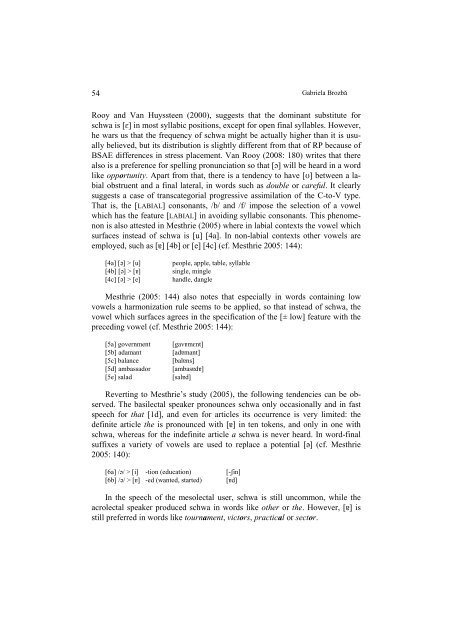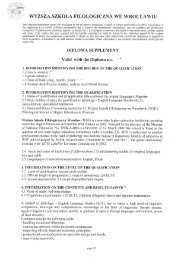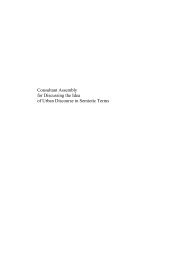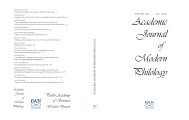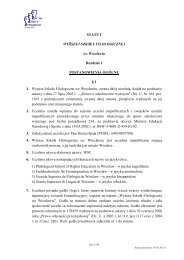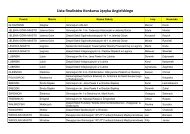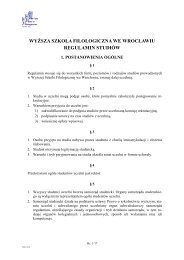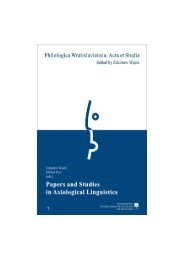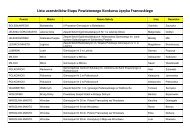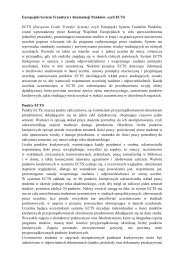s - Wyższa SzkoÅa Filologiczna we WrocÅawiu
s - Wyższa SzkoÅa Filologiczna we WrocÅawiu
s - Wyższa SzkoÅa Filologiczna we WrocÅawiu
You also want an ePaper? Increase the reach of your titles
YUMPU automatically turns print PDFs into web optimized ePapers that Google loves.
54<br />
Gabriela Brozbă<br />
Rooy and Van Huyssteen (2000), suggests that the dominant substitute for<br />
schwa is [ɛ] in most syllabic positions, except for open final syllables. Ho<strong>we</strong>ver,<br />
he wars us that the frequency of schwa might be actually higher than it is usually<br />
believed, but its distribution is slightly different from that of RP because of<br />
BSAE differences in stress placement. Van Rooy (2008: 180) writes that there<br />
also is a preference for spelling pronunciation so that [ɔ] will be heard in a word<br />
like opportunity. Apart from that, there is a tendency to have [ʊ] bet<strong>we</strong>en a labial<br />
obstruent and a final lateral, in words such as double or careful. It clearly<br />
suggests a case of transcategorial progressive assimilation of the C-to-V type.<br />
That is, the [LABIAL] consonants, /b/ and /f/ impose the selection of a vo<strong>we</strong>l<br />
which has the feature [LABIAL] in avoiding syllabic consonants. This phenomenon<br />
is also attested in Mesthrie (2005) where in labial contexts the vo<strong>we</strong>l which<br />
surfaces instead of schwa is [u] [4a]. In non-labial contexts other vo<strong>we</strong>ls are<br />
employed, such as [ɐ] [4b] or [e] [4c] (cf. Mesthrie 2005: 144):<br />
[4a] [ə] > [u]<br />
[4b] [ə] > [ɐ]<br />
[4c] [ə] > [e]<br />
people, apple, table, syllable<br />
single, mingle<br />
handle, dangle<br />
Mesthrie (2005: 144) also notes that especially in words containing low<br />
vo<strong>we</strong>ls a harmonization rule seems to be applied, so that instead of schwa, the<br />
vo<strong>we</strong>l which surfaces agrees in the specification of the [± low] feature with the<br />
preceding vo<strong>we</strong>l (cf. Mesthrie 2005: 144):<br />
[5a] government<br />
[5b] adamant<br />
[5c] balance<br />
[5d] ambassador<br />
[5e] salad<br />
[gavɐmɛnt]<br />
[adɐmant]<br />
[balɐns]<br />
[ambasɐdɐ]<br />
[salɐd]<br />
Reverting to Mesthrie’s study (2005), the following tendencies can be observed.<br />
The basilectal speaker pronounces schwa only occasionally and in fast<br />
speech for that [1d], and even for articles its occurrence is very limited: the<br />
definite article the is pronounced with [ɐ] in ten tokens, and only in one with<br />
schwa, whereas for the indefinite article a schwa is never heard. In word-final<br />
suffixes a variety of vo<strong>we</strong>ls are used to replace a potential [ə] (cf. Mesthrie<br />
2005: 140):<br />
[6a] /ə/ > [i] -tion (education) [-ʃin]<br />
[6b] /ə/ > [ɐ] -ed (wanted, started) [ɐd]<br />
In the speech of the mesolectal user, schwa is still uncommon, while the<br />
acrolectal speaker produced schwa in words like other or the. Ho<strong>we</strong>ver, [ɐ] is<br />
still preferred in words like tournament, victors, practical or sector.


